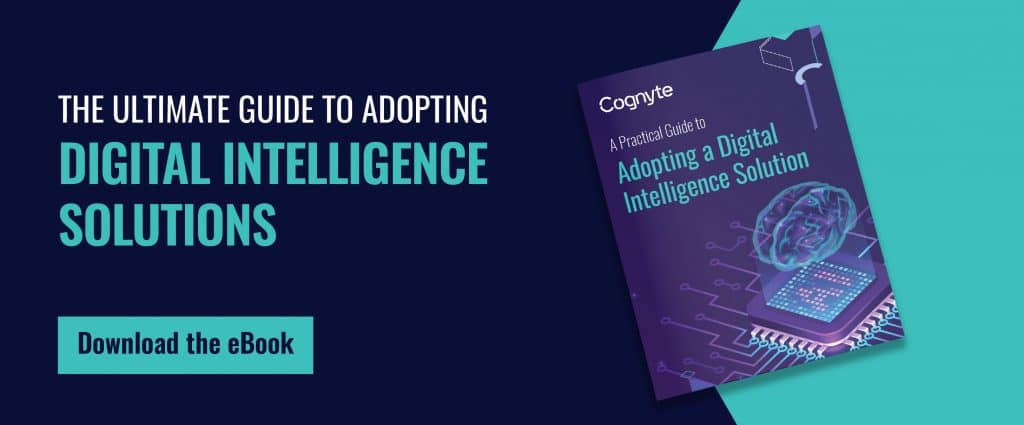How Digital Intelligence Platforms Accelerate Investigations

Digital intelligence platforms, often called investigative analytics platforms, have become increasingly popular among law enforcement and security organizations in recent years. Due to the rise of digital technologies and the explosion of big data, traditional investigation methodologies have become far too labor-intensive to keep up with the amount and diversity of data sources. The siloed nature of data exacerbates these issues. The urgent nature of investigations demands a solution to this common problem.
Innovative digital intelligence solutions are gaining traction, with well-known analyst firm Frost & Sullivan adding the category to their Frost Radar™ report in 2021. Cognyte was honored to be recognized as a leader in this domain. Frost & Sullivan recently wrote a report that deep dives into how digital intelligence solutions can benefit investigation teams. Check out some highlights below.
Why do security organizations need digital intelligence solutions?
Security organizations rely on many sources of data to gather intelligence, connect the dots, find leads, and detect and prevent threats. Criminals and terrorists are increasingly using advanced technology to commit crimes and cover their tracks, meaning that the scope of data relevant to investigations has expanded beyond traditional sources, such as government databases and surveillance footage. Valuable information can be scattered across Dark Web forums, illicit marketplaces, social media platforms, blockchain ledgers, and more. The scale and complexity of data has made it nearly impossible to effectively gather intelligence and solve investigations using traditional means.
There is an exponential growth of data, with the global amount of data created, captured, copied and consumed increasing almost 5,000% from 2010 to 2020, from 1.2 trillion gigabytes to 59 trillion gigabytes. The data expected to be created from 2021-2023 is estimated to be more than the volume of data created over the past 30 years.
This data is not just getting bigger, but it is becoming more complex as well. Organizations are not simply facing structured data sources, but also unstructured text, video, image, and audio data files. Data is also fragmented and siloed, it is often scattered across all layers of the web, in multiple databases, and even among different teams within organizations. It would be impractical and time-consuming for an individual or team of investigators to gather and analyze all of this data manually, thus necessitating advanced analytics solutions.

Digital intelligence solutions are the key to improving modern investigations
Comprehensive digital intelligence platforms collect, fuse, and analyze information in a centralized investigation workspace to provide a single, holistic investigation picture. This technology enables security teams to conduct multiple types of investigations, spanning numerous investigative domains and examining countless threats in a single-pane-of-glass view.
For example, government organizations can deploy advanced analytics on datasets that include financial transaction logs, accounting ledgers, financial institution data, and blockchain data logs to proactively flag potential financial crimes. Authorities can then utilize additional fused data sources, such as arrest records, watchlists of known suspects, and video surveillance data, to uncover the real-world identities of suspects involved in illicit activities, gather evidence and build a case.
This example illustrates the multi-disciplinary nature and complex scope of modern investigations. To keep up with the needs of organizations, digital intelligence solutions must meet rigorous requirements.
A digital intelligence solution should have several key capabilities:
- Fusion and analysis of structured and unstructured data: Since unstructured data accounts for an estimated 80% of all data generated today, it is vital that a solution can accommodate this kind of data, which includes videos, audio files, images, text and more.
- Advanced analytics: Artificial intelligence and machine learning algorithms have become essential in keeping up with evolving technology and threats. These capabilities can uncover patterns and anomalies, identify hidden connections, and proactively detect threats.
- Flexible design and easy integration: Platforms should easily integrate with existing systems and data sources and have the capability to quickly ingest new data sources.
- Collaborative features: Investigative teams can be more efficient and reach faster, more accurate conclusions with easy to use features enabling real time collaboration within and across teams.
Read the report to learn more about how digital intelligence solutions can help security organizations accelerate their investigations, as well as what to look for in a solution.